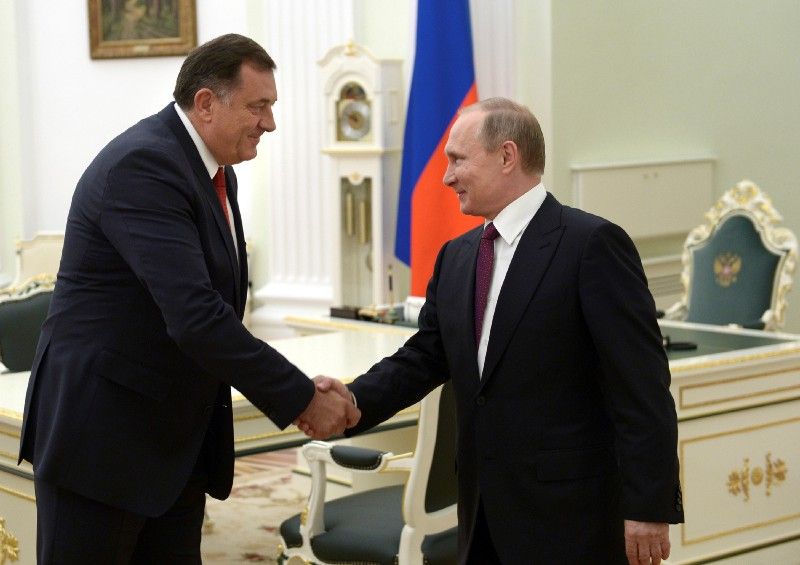February 16, 2018
Here’s a story we need to keep an eye on. When the Dayton Peace Accords halted war in 1995, a destroyed Bosnia was divided into two parts: an ethnic Serb enclave called Republika Srpska and a Bosnian-Croat federation next door. Not everyone loved the arrangement, but it was the best way to reach a much-needed peace. In March of this year, a shipment of 2,500 automatic rifles is scheduled to arrive in Republika Srpska. Bad news?
Republika Srpska says it needs the weapons to fight terrorists. Reports say Russians will be training officers in how to use them. Local authorities deny that, but there is certainly a close relationship between Republika Srpska and Moscow. Local Serb separatist leader Milorad Dodik has met with Vladimir Putin half a dozen times in less that four years. He has also cultivated ties with a sanctioned Russian paramilitary motorcycle gang called the Night Wolves.
Why might Russia be interested in Republika Srpska? Moscow is unhappy that the neighboring country of Montenegro joined NATO last June, and surely wants to prevent Bosnia from doing the same. One way to keep Bosnia off balance is to raise the temperature among Serb separatists in Republika Srpska.
Your Friday author can personally attest that Bosnia is a beautiful but politically fragile country with a troubled history that’s very much alive. The conflict that cost so many lives there in the 1990s was not so much ended as frozen. The entry of more weapons into Republika Srpska, at a time when Bosnia is struggling with the highest youth unemployment rate of in the world, could melt that stability fast. There’s a real risk of renewed violence here.
More For You
World Central Kitchen staff hand out free soup in a neighbourhood that experiences electricity and heating outages following recent Russian attacks on Ukraine’s civilian infrastructure during subzero temperatures in Kyiv, Ukraine February 3, 2026.
REUTERS/Thomas Peter
1,170: The number of high-rise buildings in Kyiv that were left without heating following a barrage of Russian attacks last night on Ukraine’s capital and its energy facilities, per Kyiv Mayor Vitali Klitschko.
Most Popular
What We’re Watching: US critical minerals summit, Rafah crossing reopens, Border violence in Pakistan
Feb 02, 2026
U.S. President Donald Trump and Japanese Prime Minister Sanae Takaichi hold up signed documents regarding securing the supply of critical minerals and rare earths, at a bilateral meeting at Akasaka Palace in Tokyo, Japan, October 28, 2025.
REUTERS/Evelyn Hockstein
Representatives from the European Union, United Kingdom, Japan, and others will meet in Washington this week to discuss a strategic alliance on critical minerals.
Hard numbers: Large protests in Czechia, UAE-linked firm has large stake in the president’s company, & More
Feb 02, 2026
People take part in a rally in support of Czech President Petr Pavel, organised by Million Moments for Democracy group in reaction to dispute between President Pavel and Czech Foreign Minister and Motorists chair Petr Macinka, in Prague, Czech Republic, February 1, 2026.
REUTERS/Eva Korinkova
80,000: The number of people estimated to be in the streets of Czechia on Sunday to show their support for President Petr Pavel after he blocked the nomination of an environmental minister who performed the Nazi salute and posted Nazi memorabilia.
US President Donald Trump and musician Nicki Minaj hold hands onstage at the US Treasury Department's Trump Accounts Summit, in Washington, D.C., USA, on January 28, 2026.
REUTERS/Kevin Lamarque
The US has started handing $1,000 to the bank accounts of newborn babies. But can policies like this one help boost sagging birthrates in advanced democracies?
© 2025 GZERO Media. All Rights Reserved | A Eurasia Group media company.
